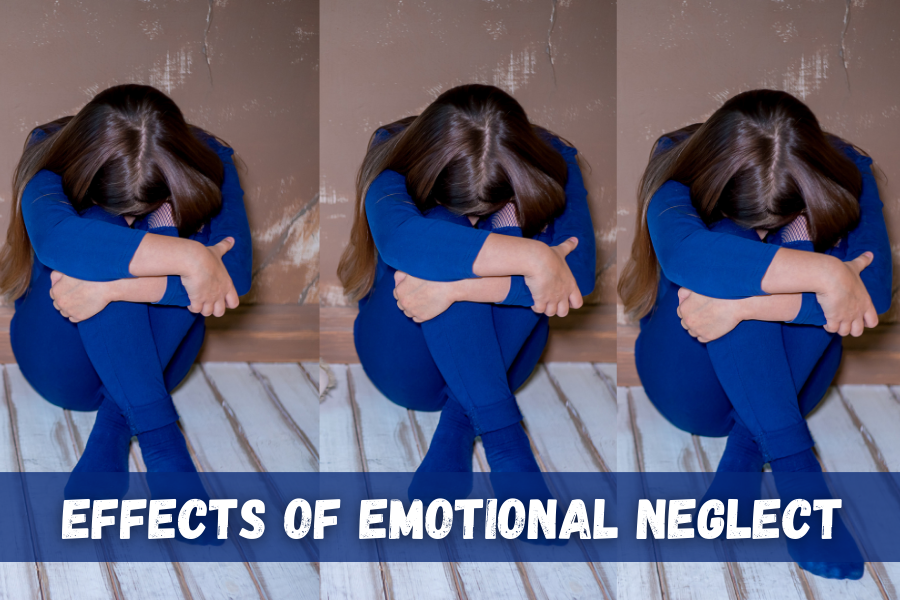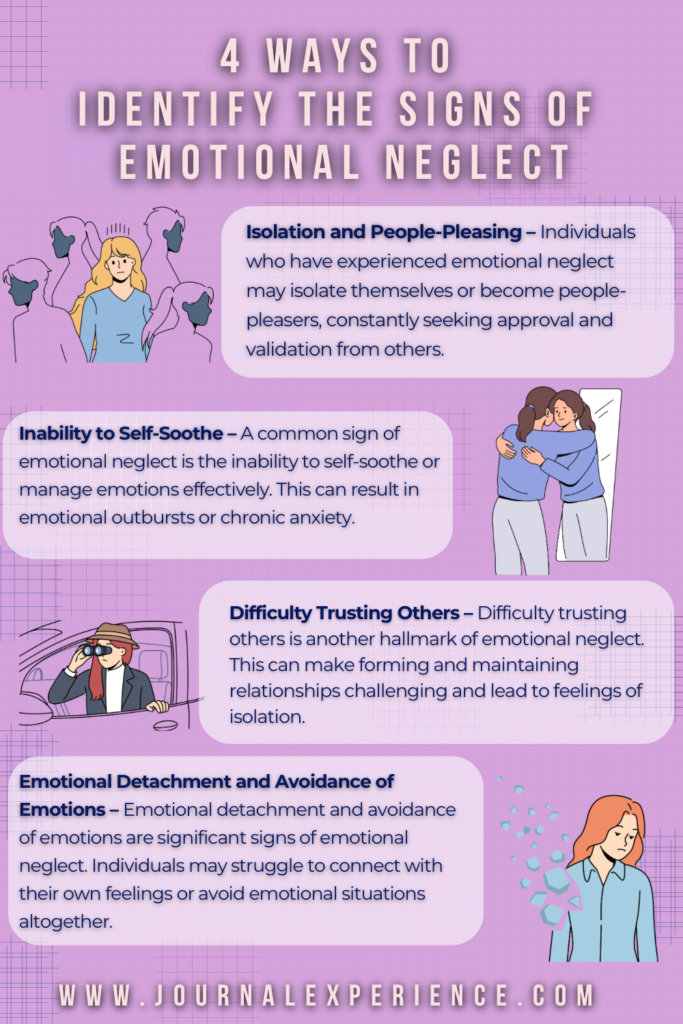Emotional neglect is a pervasive yet often overlooked form of mistreatment that can significantly impact mental and emotional well-being.

Emotional neglect occurs when important emotional needs are ignored or dismissed by caregivers, parents, or significant others.
It involves a consistent failure to respond to a person’s emotional needs, resulting in feelings of unworthiness, isolation, and distress, and understanding this is crucial for recognizing its effects and taking steps towards healing.
This blog post aims to explore the effects of emotional neglect, identify its signs, understand its impact on individuals, and provide strategies for healing.
Understanding the Effects of Emotional Neglect
The effects of emotional neglect on mental health are profound and far-reaching. Individuals who experience emotional neglect often struggle with various psychological issues,such as :
- Anxiety & Depression – Anxiety and depression are common consequences of emotional neglect. The lack of emotional support and validation can lead to persistent feelings of sadness, hopelessness, and chronic worry.
- Substance Abuse – In an attempt to cope with the emotional pain, some individuals may turn to substance abuse. This can temporarily numb the distress but often leads to additional problems and dependencies.
- Impaired Social Functioning – Emotional neglect can impair social functioning, making it difficult for individuals to form and maintain healthy relationships. The lack of emotional connection and validation in childhood often translates into social difficulties in adulthood.
- Long-term Effects on Mental & Emotional Well-being – The long-term effects of emotional neglect include chronic low self-esteem, difficulties in emotional regulation, and an increased risk of mental health disorders. Recognizing and addressing these impacts is crucial for long-term recovery and well-being.

signs of Emotional Neglect
Emotional neglect is often subtle and can go unnoticed for years. Unlike physical abuse, it doesn’t leave visible scars, making it harder to identify and address.
The signs of emotional neglect are often subtle and easily overlooked, but can manifest in behaviors that might seem insignificant but collectively indicate a deeper issue.
For example, behaviors such as excessive people-pleasing, emotional detachment, and difficulty trusting others are often overlooked but are significant indicators of emotional neglect.
Identifying the Signs
Recognizing the signs of emotional neglect is the first step toward addressing its effects and seeking help. With that being said, here’s a few signs and behaviors that indicate you or someone you know may be experiencing emotional neglect:
- Isolation and People-Pleasing – Individuals who have experienced emotional neglect may isolate themselves or become people-pleasers, constantly seeking approval and validation from others.
- Inability to Self-Soothe – A common sign of emotional neglect is the inability to self-soothe or manage emotions effectively. This can result in emotional outbursts or chronic anxiety.
- Difficulty Trusting Others – Difficulty trusting others is another hallmark of emotional neglect. This can make forming and maintaining relationships challenging and lead to feelings of isolation.
- Emotional Detachment and Avoidance of Emotions – Emotional detachment and avoidance of emotions are significant signs of emotional neglect. Individuals may struggle to connect with their own feelings or avoid emotional situations altogether.
The Impact of Emotional Neglect
Emotional neglect has a profound impact on an individual’s life, affecting their mental health, relationships, and overall well-being.
The subtle signs of emotional neglect, such as isolation, people-pleasing, and difficulty trusting others, can lead to significant emotional distress and social challenges.
Consider Nakia,who always felt her emotional needs were secondary to her parents’ busy lives. As an adult, she struggles with low self-esteem and finds it hard to trust others, affecting her relationships and career.
Specific Impacts
Emotional neglect often leads to isolation, as individuals feel unworthy of social connections. The persistent absence of emotional support can create deep-seated feelings inadequacy and self-doubt, making it difficult for these individuals to seek out meaningful relationship. Here’s a few indicators that you or someone you know may have been impacted by emotional neglect:
- People-Pleasing and Loss of Self-Identity – Constantly seeking approval from others can result in people-pleasing behaviors, leading to a loss of self-identity and personal boundaries.
- Inability to Self-Soothe and Emotional Regulation Difficulties – The inability to self-soothe makes it challenging to manage emotions effectively, leading to emotional instability and heightened stress.
- Trust Issues and Challenges in Forming Relationships – Trust issues stemming from emotional neglect can hinder the ability to form and maintain healthy relationships, causing further emotional distress.
- Emotional Detachment and Avoidance Behaviors – Emotional detachment and avoidance behaviors are coping mechanisms developed to protect oneself from further emotional pain. However, they can prevent meaningful emotional connections and personal growth.
Healing from the Effects of Emotional Neglect
Healing begins with acknowledging and accepting the impact of emotional neglect. This involves recognizing the ways in which neglect has affected you and validating your feelings and experiences.
Understanding the specific ways emotional neglect has impacted your life is crucial for healing. Reflect on your behaviors, relationships, and emotional patterns.
Accepting your feelings and experiences without judgment is a vital step toward healing. This allows you to move forward with compassion and self-awareness. Here’s some strategies we’d recommend :
- Seeking Professional Help – Professional help can provide the support and guidance needed to heal from emotional neglect.
Working with a trauma-informed therapist is often essential.If you’re ready to go deeper into your healing journey with expert guidance, the Codependency Therapy | Self Love Recovery Treatment Program offers structured, trauma-informed strategies designed for survivors of emotional neglect.
- Therapy: Finding a Therapist Specialized in Trauma or Emotional Neglect – Finding a therapist who specializes in trauma or emotional neglect can be incredibly beneficial. They can provide tailored strategies to help you process and heal from your experiences.
- Support Groups: Gaining Support from Others with Similar Experiences – Support groups offer a safe space to share experiences and gain support from others who have gone through similar challenges. Connecting with others can be incredibly validating and healing.
- Building Self-Awareness – Building self-awareness is essential for understanding your emotions and developing healthy coping mechanisms.
Recognize emotional patterns and triggers. Programs like the 11-Stage Self-Love Recovery Treatment Program and Healing The Inner Trauma Child (HITCH) Method can help you understand your emotional responses, reconnect with your inner child, and rebuild a sense of emotional security.
- Practicing Mindfulness: Becoming Aware of Your Emotions and Thoughts – Mindfulness practices can help you become more aware of your emotions and thoughts, allowing you to respond rather than react.
- Journaling: Expressing Feelings and Reflecting on Experiences – Journaling is a powerful tool for expressing feelings and reflecting on experiences. It provides a safe space to explore your emotions and gain insights into your healing process.
- Improving Emotional Intelligence – Improving emotional intelligence involves learning about emotions and developing skills to manage them effectively.
- Emotional Education: Learning About Emotions and Effective Management – Educating yourself about emotions and how to manage them can empower you to navigate your feelings more effectively and build healthier relationships.
- Expressing Emotions: Healthy Ways to Express Feelings – Finding healthy ways to express emotions, such as through art, conversation, or physical activity, is crucial for emotional well-being.
- Enhancing Communication Skills – Enhancing communication skills can improve your relationships and help you express your needs and feelings more effectively.
- Assertiveness Training: Communicating Needs and Feelings Assertively – Assertiveness training teaches you to communicate your needs and feelings confidently and respectfully, fostering healthier interactions.
- Active Listening: Improving Relationships and Understanding Others – Active listening involves fully engaging with the speaker, showing empathy, and providing feedback. This skill can greatly enhance your relationships and understanding of others.

Reources for Healing
There are numerous books and articles available that provide valuable insights into emotional neglect and strategies for healing. Some recommended readings include “Running on Empty” by Jonice Webb“ and “The Emotionally Absent Mother” by Jasmin Lee Cori.
Online Communities and Forums
Online communities and forums offer a platform for sharing experiences and finding support. The Journal Experience offers a great forum community that provides safe spaces for discussion and sharing experiences with like minded individuals.
Professional Help and Hotlines
Seeking professional help is essential for addressing the effects of emotional neglect. Hotlines such as the National Alliance on Mental Illness (NAMI) Helpline (1-800-950-NAMI) offer support and resources.
Overview
Understanding and healing from the effects of emotional neglect is a journey that requires acknowledgment, acceptance, and proactive steps. By recognizing the signs and seeking support, you can begin to heal and build a healthier, more fulfilling life.

Join the experience, where you can share your experiences and find support from others on a similar healing journey. Connect with like-minded individuals, access additional resources, and read related blog posts on emotional health and well being.